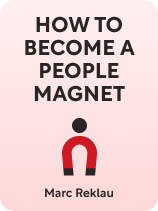

This article is an excerpt from the Shortform book guide to "How to Become a People Magnet" by Marc Reklau. Shortform has the world's best summaries and analyses of books you should be reading.
Like this article? Sign up for a free trial here.
How charming are you? Is it possible to build an instant connection with someone?
Knowing how to make a good impression on people is an essential skill in both personal and professional settings. In How to Become a People Magnet, Marc Reklau says that you can leave a memorable mark on everyone you encounter by focusing on them, showing genuine interest, and staying positive.
Read on to discover expert tips for winning people over from the moment you meet them.
Making a Good Impression on People
The first essential part of any social interaction is making a good first impression—charming people so they want to get to know you better. Reklau explains that first impressions are all about making the other person feel good to ensure they enjoy talking to you. If you make someone feel good, they’ll have an incentive to get to know you.
Reklau’s advice on how to make a good impression on people is to help people feel great by focusing on them and staying optimistic and upbeat.
(Shortform note: Communications expert Leil Lowndes (How to Talk to Anyone) writes that first impressions are about making people feel good in a more specific way: Making them feel liked. He argues that the desire to feel liked governs all social interactions. This suggests that you shouldn’t focus entirely on making the other person feel good in general—you also have to show that you feel positively toward them.)
Focusing on Others
During a first impression, Reklau explains, you should center the conversation around whoever you’re speaking to. People love talking about themselves, so if you focus on them they’ll love talking to you too. Reklau offers two ways to keep the conversation focused on others: learn their interests and agree with them.
(Shortform note: Before you can center your conversation around someone, you have to find people to talk to in the first place—something that can be stressful for people with social anxiety. Author Vanessa Van Edwards (Captivate) recommends you make this process easier by approaching people at a time and place where they’ll want to talk. You’ll have an easier time starting a conversation with people who are willing and eager to speak to you. Specifically, Van Edwards suggests finding groups that are settled in one spot (as opposed to transitioning from one place to another) but who aren’t closed off or holding a private conversation. You can also speak with the host of an event, who can introduce you to others.)
Learn Their Interests
If you’re starting a conversation with someone new, the simplest way to focus the conversation on them is to ask them about their interests. This guarantees your topic will not only be something the other person likes but also something they know a lot about—both of which help keep a conversation going strong. Reklau suggests that if you know who you’re going to meet, you can even take some time to research their interests by asking mutual friends or checking social media. Then you’ll have a good idea of what to talk about when you meet.
(Shortform note: To get a better sense of someone’s interests, communication expert Debra Fine (The Fine Art of Small Talk) recommends you prepare a list of questions you can ask people before a social event. This means you can direct the conversation toward their interests easily and always have something to fall back on if the conversation slows. Fine explains that you can tailor these questions to specific people or to the social event itself—a classic example is asking how someone knows the host of a party, then asking follow-up questions about their answer.)
Agree With Them
Reklau says you can also keep the conversation focused on the other person by agreeing with what they tell you. Agreeing with others reduces the chances of conflict and also makes them feel more connected to you. You should also show your agreement while they’re talking to you—nod your head, say “yes,” or “um-hum,” and offer simple comments of agreement like “I know what you mean,” or “totally.” Reklau says you can also signal “agreement” by mirroring someone else’s body language to subconsciously signal you’re on the same page as them.
(Shortform note: Vanessa Van Edwards (Captivate) notes that you can also signal agreement by highlighting connections between you and your conversation partner. By noting the interests or perspectives the two of you have in common, you’re essentially showing you agree with what they have to say. For example, if someone mentions liking a TV show you enjoy, you can build on their comment by saying you like it too and then discussing why.)
Stay Optimistic and Upbeat
You can also make a good first impression and ensure people enjoy talking to you by remaining optimistic and upbeat, Reklau explains. This signals to others that you’re someone worth talking to and getting to know. In addition, positivity is contagious, so if you seem like you’re enjoying yourself, others are more likely to as well. To present yourself positively, approach conversations with friendliness and enthusiasm. Always have a smile on your face and participate eagerly. When you talk about yourself or what you do, do so with pride and confidence—if people see that you like yourself, they’ll want to like you too.
(Shortform note: Communications experts explain that a crucial part of appearing confident and upbeat is using open body language cues, which include smiling, eye contact, an upright posture, and gesturing when you speak. These cues subconsciously signal to the other person that you’re friendly and excited to converse with them. On the other hand, you should avoid closed body language cues like clenching your fists or pointing fingers, which come across as aggressive.)

———End of Preview———
Like what you just read? Read the rest of the world's best book summary and analysis of Marc Reklau's "How to Become a People Magnet" at Shortform.
Here's what you'll find in our full How to Become a People Magnet summary:
- Why charisma is a learned skill, not something you’re born with
- How to make a first impression that’s unforgettable
- How to persuade people to do what you want






